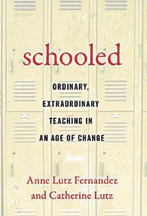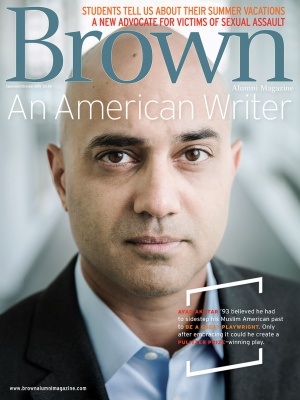Politicians love to blame teachers and their unions for everything
that’s wrong with schools. Yet teachers are seldom asked what they
think. Anthropologist Catherine Lutz, the Thomas J. Watson Jr. Family
Professor of Anthropology and International Studies, and her sister,
high school teacher Anne Lutz Fernandez, recently traveled the country
to get teachers’ views and have published them in Schooled: Ordinary, Extraordinary Teaching in an Age of Change.
 Why was it important to feature personal accounts from teachers rather than simply report research findings?
Why was it important to feature personal accounts from teachers rather than simply report research findings?
Politicians,
pundits, and business leaders are driving the conversation and pushing
through reforms to a system that is populated with experts on the
topic—teachers. We wanted to give teachers an opportunity to share
their experience- and knowledge-based perspectives.
What challenges do teachers report facing?
Broad social and economic changes are making teaching harder: widespread child poverty, widening income inequality, growing cultural and linguistic diversity, rising numbers of children with disabilities, frequent school violence, limited job opportunities and ballooning college costs, contracting public budgets, and persistent racism and segregation.Which of these are having the greatest effect?
Basic economics. Astoundingly, roughly half of America’s public school children are growing up in low-income households. A deep body of research has consistently shown that poverty, especially extreme and persistent poverty, has a tremendous and complex impact on children’s physical, social, and emotional health, cognitive ability, and resulting academic achievement.What, if anything, is working well for teachers?
Although the percentage of teachers reporting high satisfaction with their jobs is the lowest it’s been since the 1980s, it’s still pretty high. Despite their many challenges, they derive deep satisfaction from their relationships with students, parents, and other teachers.Teachers echoed each other frequently when they spoke about the pleasure they get from seeing children’s faces light up when they learn something new. We saw firsthand the tremendous affection they have for and get from their students and the larger community they work in. For example, when asked to journal about a daydream, one little girl said she dreamed her teacher was her mother.
How do teachers view various attempts at school reform?
When they find reform strategies to be consistent with their educational philosophies, teachers are adopting them. We observed a South Carolina teacher who believes in interdisciplinary approaches employing nonfiction literacy strategies from the Common Core in her chemistry class. At the other extreme, some are opting out of the system altogether, finding it untenable. Soon after our visit, new teacher Lindsey McClintock left the Arizona classroom in which we saw her take third-graders through scripted, standardized lessons. She entered private counseling, where she hopes to provide children with the social–emotional component being stripped from teaching.And in the vast middle, teachers are working hard to hold on to what they know is good pedagogy. This can lead, as one educator put it, to “sneaking a lot of good teaching” in “under the table.”
Other educators, emboldened by experience, reputation, tenure, or school climate, are more vocal in adhering to the methods they know work best.
What about standardized tests?
Teachers see higher stress among students who frequently face high-stakes tests that can affect their grade promotion, course placement, and graduation, but also their teacher’s pay or their school’s funding and fate. We saw how fixating on these tests narrows the curriculum—with the arts, social sciences, and physical education reduced in schools that are compelled to devote more time to the tested subjects.Most disturbing of all is the evidence that our massive testing regime has resulted in little good. National test scores have risen only modestly over the last decade. In other words, it’s not doing much to improve learning—even the narrow band of learning that these tests can assess.





